PODCAST: An uprising for Palestinian unity
By Amjad Iraqi, Edo Konrad and Henriette Chacar June 3, 2021
On May 24, Israeli police launched the largest nationwide crackdown against Palestinian citizens of Israel in decades. The campaign, known as “Operation Law and Order,” has led to the arrest of hundreds of Palestinians who participated in last month’s mass wave of protests, sparked by the imminent expulsion of Palestinian families in Sheikh Jarrah, police raids of Al-Aqsa Mosque, and the war on Gaza.
The police have tried to paint the operation as a response to both Jewish and Arab “rioters” and “criminals,” but the overwhelming number of Palestinians arrested and indicted makes clear exactly who is the target. The political goal of this campaign is also very evident: to suppress the mass demonstrations and civil disobedience that have risen against Israel’s apartheid policies — including a successful general strike on both sides of the Green Line — in what is being described as the “Unity Intifada.”
Now, as Israel sets to swear in a new government, most likely led by the far right Naftali Bennett, the police’s operation continues unabated. The editors of +972 Magazine sat down at the height of the crackdown last week to discuss what led to this moment, the synchronization of the Palestinian struggle from the river to the sea, and how Israeli and international media have been covering recent events. The conversation was edited for length and clarity.
Edo Konrad: We’re in this moment where things are shifting really, really quickly. We’re in the middle of a huge crackdown on Palestinian citizens of Israel, an arrest campaign by the Israeli police following a war on Gaza, violence across the country in Jerusalem, Al-Aqsa, Sheikh Jarrah. I thought that sitting with you guys, maybe we can make sense of this for ourselves for our listeners. Kind of process this moment. And maybe we can start by talking about how we actually got to this moment, what the police have called Operation Law and Order, in which they’ve arrested over 250 Palestinian citizens of Israel and have threatened to arrest hundreds more after already having arrested 1,500 Palestinians over the last few weeks across the country. Amjad, we’ll start with you. How did we get to this moment?
Amjad Iraqi: As always with a lot of things in Israel-Palestine, there are things that seem unprecedented, and yet in the large cycle of the history here, the dynamics actually tend to be quite consistent throughout. So, just to bring everyone back on the same level playing field: the way this all started was a few weeks ago where the real epicenter for this massive rise in protests and violence started in Jerusalem, one of the centerpieces at the heart of the conflict.
There were essentially two parallel struggles that were happening in the city. On one level, there were Israeli police restrictions and repressions on Palestinians who were trying to practice their rights to worship and to use public spaces on the Al-Aqsa Mosque compound and the mosque itself, and at Damascus Gate in the Old City. The Israeli police were imposing a lot of arbitrary restrictions, and what would eventually lead to violent repression of the protest and resistance to that.
The other parallel activity was the struggle in the neighborhood of Sheikh Jarrah, which is one out of many Palestinian neighborhoods in the city, which are facing forms of forced displacement and expulsion and evictions. But what happened was rather extraordinary, whereby these two struggles almost intertwined at the same time. The Israeli authorities were really overreaching on both these fronts. And as these struggles became interlinked, it started sending these new ripple effects, this new energy, not just among Palestinians in Jerusalem itself, but Palestinians all across the board. We saw Palestinian citizens of Israel — that’s 20 percent of Israel’s citizenry — coming out in many ways in full force, in support of the Palestinians in Jerusalem, going against what the Israeli police were doing in the city. And this was joined by Palestinians in the occupied territories, in the diaspora, and allies abroad. There was a sudden re-energization, which really has not been seen in a very long time — not to this scale at least, in two decades.
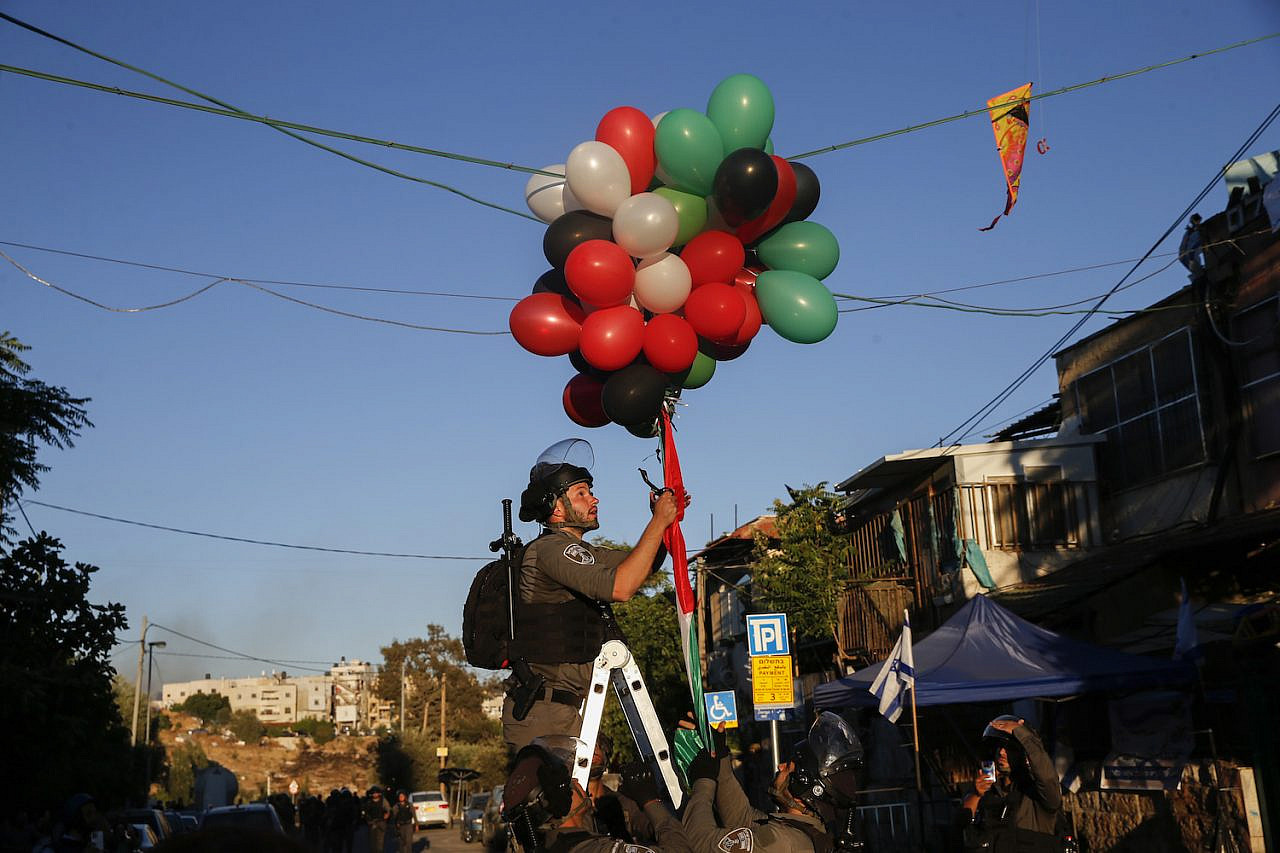 |
There are many details in this, but this is the sort of energy that’s been flowing. And that energy has basically been met by Israeli state repression and state violence across the board. It devolved into massive police arrests of Palestinian citizens, as Edo was mentioning. This operation is just the latest phase of this campaign. But also, at the same time, you had the Israeli army shooting live bullets at Palestinian protesters in the West Bank. And, of course, you had Israeli fighter jets bombarding Gaza when Hamas decided to intervene militarily on the back of these protests.
These seem like fragmented pieces, but they are all interconnected. It’s both the synchronization of Israeli state violence to put Palestinians back into their cages, and the synchronization of Palestinian resistance across the Green Line, regardless of their citizenship or their geography, to push back against it.
Edo Konrad: Over the past few weeks, we’ve been witnessing Palestinians across the country, both in the occupied territories and in Israel, rising up in unison for the first time in a long time over the violence in Jerusalem, in Gaza, and inside Israel. And one of the key moments in that rising up has been a general strike that was called a few weeks ago, which Palestinians from across the political spectrum, across the country, participated in — they didn’t come to work, they held cultural activities, political activities in their cities and towns and villages. Henriette, you spent the day in Haifa the day of the general strike. What was that like?
Henriette Chacar: It was very inspiring. I arrived in the morning to the neighborhood of Wadi Nisnas, and there was already a band playing in one corner, some people dancing in the middle of the street. There were children and their parents painting on one of the walls. Soon after, there was a “know your rights” workshop that a volunteer lawyer gave. It was a reminder that with all of Israel’s efforts to separate us from Palestinians in the West Bank and Gaza, with all of Israel’s efforts to erase our Palestinian heritage, people still remember. These are now third- and fourth-generation Palestinians to the Nakba who are still defining themselves this way, who are still talking about Palestinian liberation, even only a few nights after witnessing terror in their own streets.
Edo Konrad: One of the things that came out of this moment was what’s being termed as a “United Intifada,” in which Palestinians from the occupied territories and from Israel are connecting, saying these borders are artificial, they don’t matter, we’re all united in a single struggle against Israeli state repression, against colonialism, against apartheid. Amjad, can you give us a little bit of a background on that? Because this isn’t the first time that Palestinians from across the country have united, but it almost seems like this might be one of the most powerful moments that we’ve seen to date in terms of this Palestinian unity.
Amjad Iraqi: I guess something that always needs to be clarified is that, even though sometimes it seems like there’s a bit of dormancy — especially among Palestinian citizens of Israel, who sometimes turn their energies toward Israeli systems — it has never meant that they have somehow forgotten or erased their Palestinian identity. That knowledge and awareness is always there.
This is not the first time that Palestinians in ‘48 have come out like this. The Second Intifada was a prime example of that. Even in the past decade, things like the Prawer Plan to displace Bedouins in the Naqab/Negev, they came out in force; during the 2014 Gaza war, which was also preceded by the burning of Mohammad Abu Khdeir in Jerusalem; and then also the Great March of Return in Gaza in 2018. These are episodes where you have seen these major flashes of unity and synchronization.
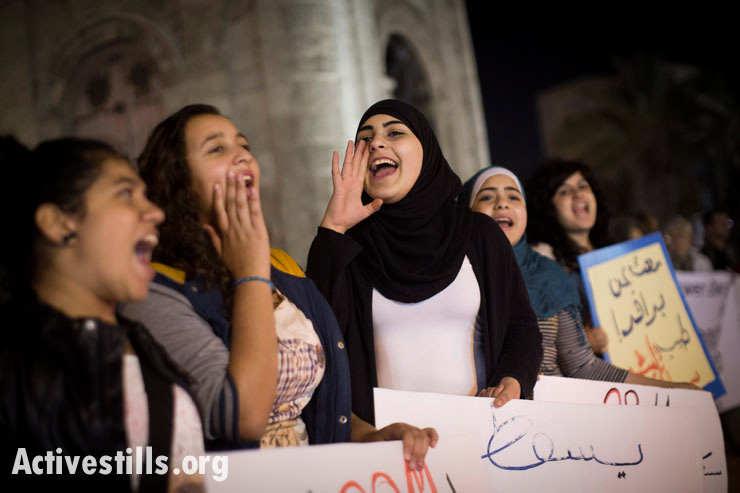 |
What makes it extraordinary now is the extent to which it has really spread. When you go to these protests, the first thing you would notice is that they’re almost entirely led by young activists. Some of the people who’ve attended these protests have never been to a political protest in their life, and they’re coming out chanting these slogans for Palestine, for Sheikh Jarrah, for Jerusalem.
Edo Konrad: As opposed to the old political guard, maybe from the political parties or the High Follow-Up Committee, that used to lead these kinds of things.
Amjad Iraqi: Very much so, especially in ‘48. It might be a strong statement to say, but these protests in many ways are as much an act of defiance against that traditional leadership as they are toward the Israeli state. And there’s a reason for that. There’s been a lot of disillusionment with, for example, the Arab political parties that ran for the Knesset, that made up the Joint List, that became the third largest party last year, only to be dismissed and rejected. The High Follow-Up Committee is basically regarded as being led by these old Arab uncles above the age of 50, who don’t really represent the community anymore.
Edo Konrad: Right. They’re an umbrella political group that’s supposed to represent Palestinian interests inside Israel.
Amjad Iraqi: Exactly. And so what you’re seeing at these protests are these young activists taking to the streets and saying, “we want the mantle of the movement, we’re done with these old ways of doing things.” And these ways of doing things were conducted for the past two, three decades, since the Oslo era, whereby much of the traditional leadership still buys into the old language of being a minority, of trying to work in the Israeli political and legal system. There’s a lot of nuanced debate about this, no doubt, and being a Palestinian citizen will always require those grey zones. But by seeing these actions on the street and specifically revolving around Jerusalem, and by pushing for the strike that Henriette was just describing right now, for pushing it to be a strike that’s from the river to the sea and for everyone abroad — that’s radically different from what strikes used to be inside ’48, in which hardly anyone for the past few years would follow it, and it was only within ‘48. The activists made a job of taking the date that was announced, utilizing it, and doing the events that Henriette was just describing.
I echo everything that Henriette was saying — the pride and the joy, and the unison with which that emerged, was incredible. There was a statement put out by activists declaring this a “Unity Intifada.” And this, in many ways, is the victory of this uprising, which could be very short-lived, but the victory has already been set in putting Palestinians back at the center of the conversation, at a time when everyone thought the Palestinian cause was dead, so to speak, with the Abraham Accords, with the U.S. and EU ignoring Israel-Palestine, with Israel entrenching its apartheid regime, that everyone would just suddenly forget. But the fact that this third, fourth generation is not just as assertive of its Palestinian identity, it’s even more assertive of its Palestinian identity, and has more resources, from social media, to their education, to just the fearlessness or the overcoming of fear that’s taking them down to the streets. That itself is a victory. There are still a lot of question marks about how to continue this organizing — they know their protests aren’t enough — but it’s to say, we, the young people of Palestine, want to determine how we’re moving forward from here.
Edo Konrad: We’re witnessing a blowback to that, the repression of that Palestinian unity. I think we should mention that a lot of this did start inside Israel. It started after events that took place in the so-called “mixed city” of Lydd, historically a Palestinian city where in 1948, the majority of the Palestinian residents were expelled and replaced by Jewish immigrants to the newly founded State of Israel. A few weeks ago, a Palestinian citizen of Israel was shot dead by Israelis in the city during confrontations around what was happening in Al-Aqsa. These were protests that were taking place in Lydd, in solidarity with what was happening in Jerusalem.
The following day, you had a mass funeral in Lydd by Palestinians. Police tried to put that down and suppress it. That turned into violence by Palestinian citizens, including torching of property, attacking people in the city, burning synagogues, and then reprisals to that by Jewish mobs across the country, and the kind of violence that we hadn’t really seen in a long time in Israel-Palestine, or at least the kind of outward violence that is usually hidden from view for the vast majority of people, especially Israeli Jews.
I think we should mention that while Palestinians did engage in violence in this moment, the Jews that were lynching Palestinians in the street often had the backing of the state apparatus, had the backing of the police. The number of indictments that have been filed against Palestinians who took part in violence grossly outweighs the number of indictments that have been filed against Jews that have taken part in the violence. There was a lynching on national TV in Bat Yam, where people were going up to the cameras and bragging, “we did this.” This is a Palestinian driver that was taken out of his car and beaten. They were out there bragging about this really, really horrific scene.
Amjad Iraqi: In that respect, Lydd was one of the most extreme manifestations of that, where you saw that from the state violence all the way down to the lynch mobs.
Edo Konrad: Right, you had settlers coming in from the West Bank to “defend” the Jewish community in Lydd. And the officers, the police that had taken over the city and put it under curfew, where letting them come in, allowing them to throw stones. Oren Ziv documented this and published a number of pieces on it on +972, in which you see settlers throwing stones at the Palestinians and the city while riot police are shooting tear gas at them, and not stopping the settlers from doing this kind of thing. This very brazen collusion that we’d seen images of before in the West Bank, but I don’t think I’ve ever seen that kind of thing inside ‘48 before, which was new and stunning to a lot of people.
Amjad Iraqi: It really starkly showed and rightly shattered that myth of coexistence. We could talk about this endlessly, but the fact that these “mixed cities” — like Lydd, like Akka, like Haifa and Jaffa, for example — really demonstrated the extent to which that coexistence is based on Palestinian silence. It’s never that the violence and the state’s eating up of these cities, specifically for Jewish habitation and Jewish settlement, ever stopped. There were reasons for these protests, there were reasons for these riots, or whatever you want to describe it as.
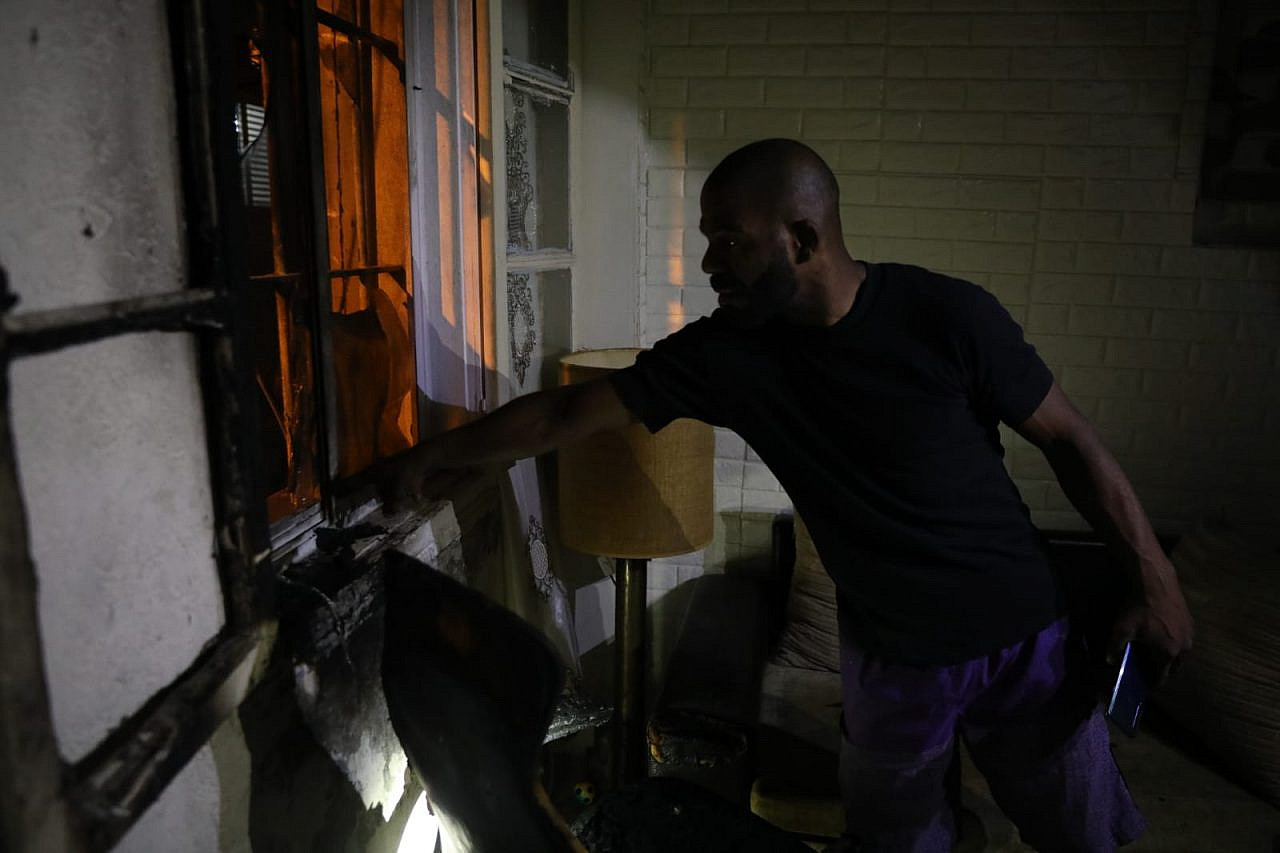 |
Edo Konrad: When you say Palestinian silence, like a silencing of Palestinians?
Amjad Iraqi: A silencing of Palestinians, and also partly it’s an endurance mechanism. There’s a reason why you don’t see these protests every day. It’s hard to keep up the kind of resistance we saw these past few weeks over 70 years. But there are other strategies that are at play. Lydd is a prime example, and I encourage everyone to read Oren’s articles, but I’m also curious about how this manifests in a place like Yaffa, which is right next to Tel Aviv, is a major center that people are fully aware of, and also has this idea that Jews and Arabs are coexisting. I’m curious, Henriette, how you witnessed the events unfolding over there, the context that we should be interpreting this, and what you saw or reported on the ground.
Henriette Chacar: Yaffa is a shocking case of how the violence is ongoing. And I actually want to go back to how you introduced this topic, Edo, because you were talking about how there was something surprising about this public show of violence between citizens. It’s no longer militant groups fighting each other or the Israeli state or military oppressing Palestinians, but it was citizens fighting other citizens. It’s only surprising if you’re part of the privileged group because you’re defining violence in a very specific way that’s self-serving. There is something extremely violent about families being repeatedly forcibly displaced from their homes and not given any just resolution for where they should go. There is something extremely violent about being afraid to speak your language in public spaces, because you might get physically assaulted, or silenced in your workplace. There is something extremely violent about having your family be dispersed across the world because you can never meet in Palestine, based on the different IDs you hold. So, there has always been violence, it’s just about what we’ve been paying attention to and how we’ve been describing it.
We’re seeing that in Yaffa as well. Over the past few weeks, there was a very, very heavy police presence. I had to figure out several times how to get to my parents’ home, because there were flying checkpoints. There were several cases of police acting in a very aggressive way for no reason other than to show force. And we’ve seen that in the West Bank, this policy of asserting control, asserting power. We’ve heard soldiers talk about their service in that sense, where the only purpose of being in those spaces is not really to deter any kind of actual threat or violence, but just to show the citizens that they will always be under the boot of the Israeli government and the Israeli forces.
Edo Konrad: I really appreciate the reframing that you did on understanding violence, how the privileged group understands violence and when violence is apparent to us as Jewish Israelis, and when violence isn’t apparent to us. I think one of the things that we’ve been talking about on the site has been the role of the Israeli media and the Hebrew media, kind of reinforcing these things — from discovering what happens to Palestinian citizens years after the story has already become an old story, and that’s maybe the best-case scenario, and then the worst-case scenario is just straight up incitement that we’ve seen, particularly around the multiple wars on Gaza. I think every time it gets worse and worse, the way news broadcasters and presenters don’t want to talk about Gaza, or sometimes they will be pressured into showing images of Gaza in order to show the Israeli viewer an image of victory that the Israeli government and the Israeli army want to project. Can you talk a little bit about how media coverage enforces this understanding of what violence looks like, and when the powerful group understands violence, can see violence?
Henriette Chacar: We’re seeing how Israeli media is not actually doing its job. We’re seeing it be an extension of state propaganda. There is this immediate echoing of the police line, of the military line. There is this lack of scrutiny that borders on gaslighting of Palestinian citizens. The anger that was felt across the city was a reflection of how invisible it can feel to be Palestinian in this country.
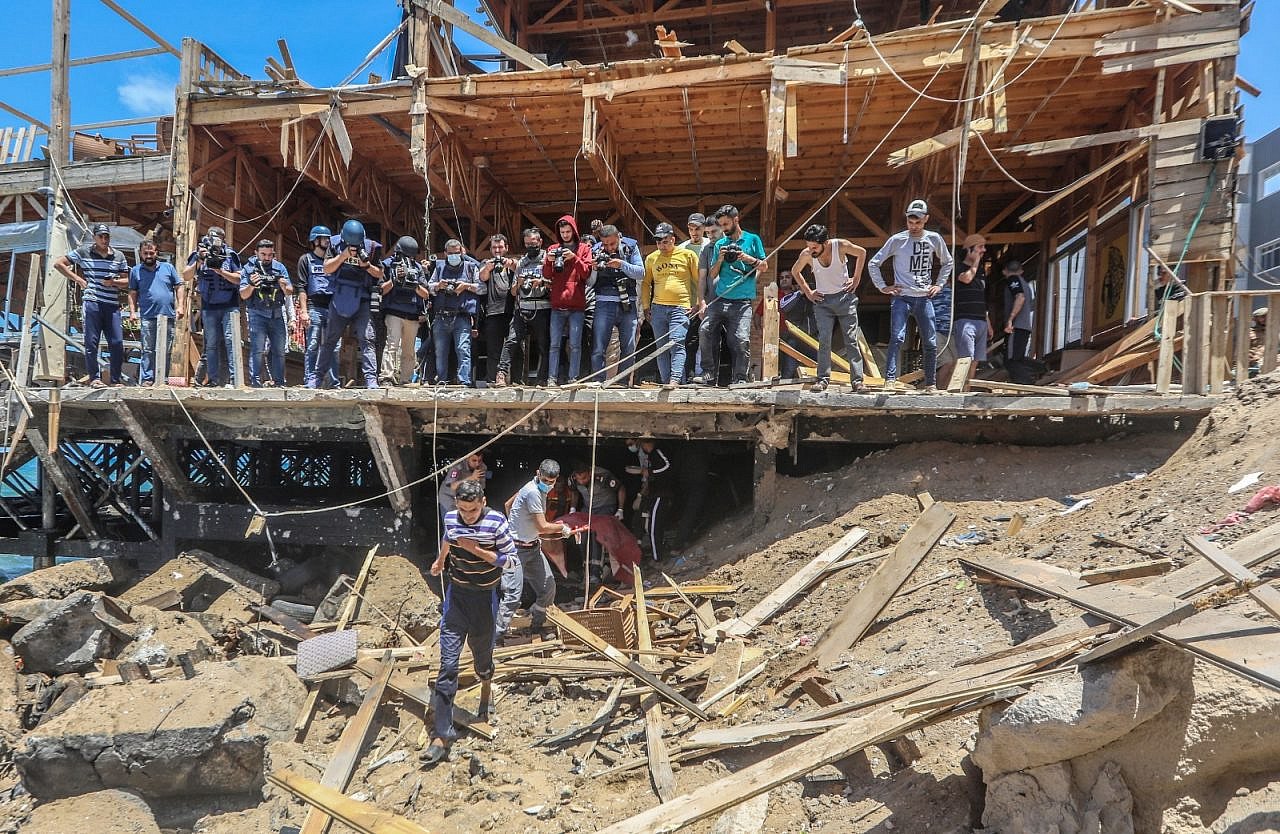 |
Amjad Iraqi: I want to tag onto what Henriette was just explaining about the invisibility. One of the dark things about being Palestinian is the extent to which Israeli media, but also international media, has tended to talk about Palestinians without ever talking to Palestinians. At the same time, there has been quite a difference in the way that many media outlets abroad are covering this.
On the one hand, you have Palestinians on the ground — whether they’re activists, regular people, residents, scholars, you name it — using social media, especially, to get their voices out there, to document the facts on the ground, to have people see what is going on. And this is not just, for example, in Yaffa, where you saw the family right after the arson attack was committed, but also in Gaza, whereby in the past, international media outlets would just take the Israeli army’s press release at face value.
But, people are starting to realize that the army is saying that it’s hitting Hamas tunnels, and at the exact same time, they’re seeing Palestinians from Gaza put a video of people pulling their families out of the rubble of destroyed homes, dead and alive. That dissonance, it can’t be escaped anymore by journalists, by policymakers, by analysts. It’s not a new power, but it’s a power that’s really being utilized and can be utilized by even the most ordinary Palestinian on the street, from kids to adults. And that, I think, has really changed a lot of the dynamic and the conversation around it.
The second thing is, I personally saw a lot of international journalists actively reaching out for Palestinians to hear what they had to say about the situation, much different from what it was in the past.
Edo Konrad: The centering of Palestinian voices finally happening.
Amjad Iraqi: Very much so, especially among American media outlets. We talked about how the Black Lives movement of last year, especially after the killings of George Floyd and Breonna Taylor, forced some very serious conversations among American media outlets about the Black struggle in United States, centering Black voices, that you can’t just have people talking about them, but they need to also speak for themselves.
Edo Konrad: The right to narrate.
Amjad Iraqi: Exactly, the right to narrate, the permission to narrate. So, there was a much more active effort on the part of these media outlets to do that. I’m not saying it’s drastically revolutionized, but I do think that there was something significant about that. And that’s really credit to Palestinians asserting themselves through these alternate media channels, but also the organizing that’s been done, the interconnectedness that goes beyond the Palestinian struggle, like the conversations in the United States and other communities about racialized and oppressed groups, especially those that have experienced state violence to such extremes.
These are conversations that are beyond this, but which we definitely felt over the past few weeks, and I think that’s a very significant shift in its own respect.
Henriette Chacar: Edo, this makes me wonder, we are an international-facing media outlet, but we’re also based in Israel. I’m wondering, as the editor-in-chief, what this moment means to you as a Jewish-Israeli-American, what role you think you have both as a citizen here who is part of the colonizing group, whether you identify this way or not, but also as someone who is a journalist?
Amjad Iraqi: And tied with that, I’m curious also about the differences or dissonances that you’ve seen between the conversations here among Jewish Israelis, even among the more activist circles, versus the activist circles among American Jews and the conversations that are shifting there.
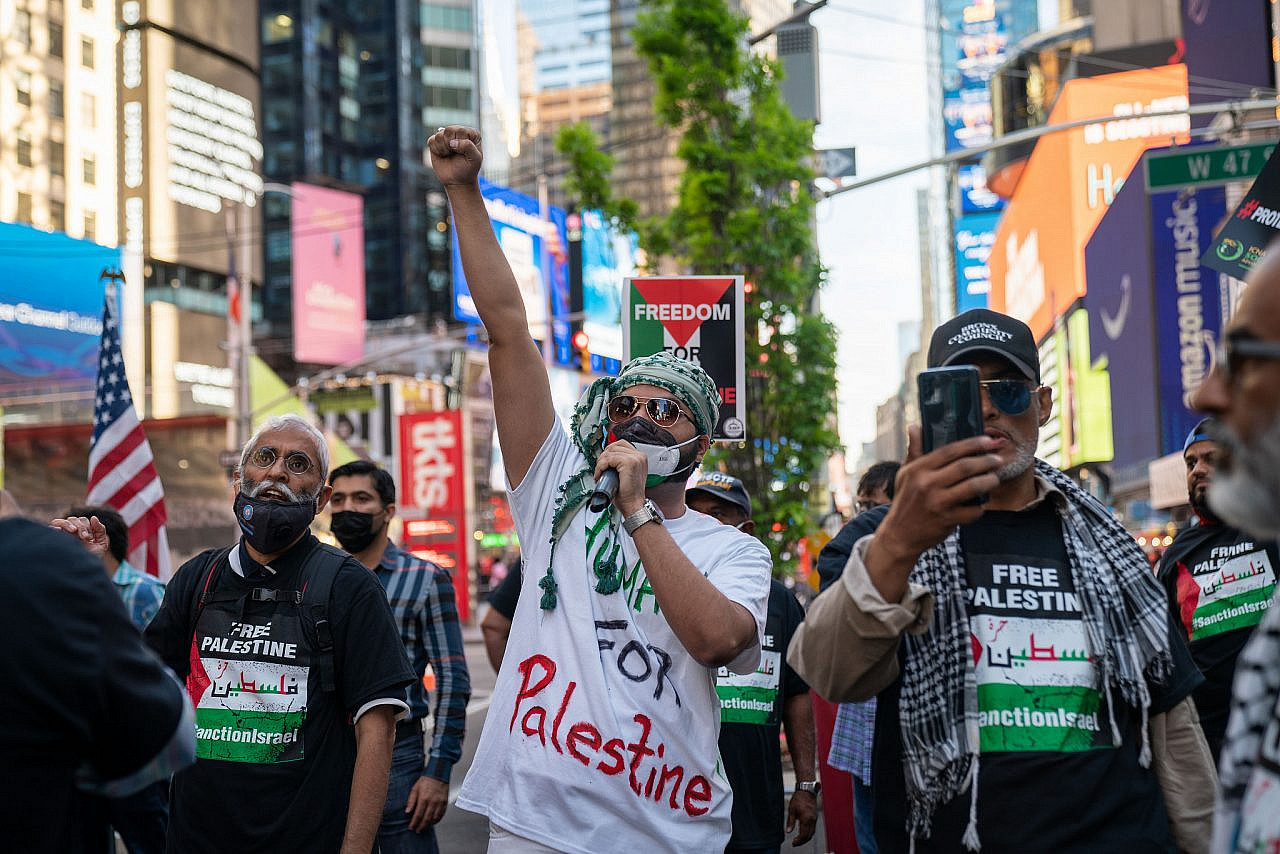 |
Edo Konrad: Good questions. I’ll wear several hats here, and I’ll start by speaking as an editor. As the editor-in-chief, I think what we’re seeing now — the centering of Palestinian voices, Palestinians actually having the permission to narrate and tell the story, and being invited on CNN and MSNBC and places where in the past they weren’t invited — is something that I continue to aspire to bring to +972 and something that we’ve been actively working on for the past few years. I see that as a testament to the kind of work that not only we’ve been doing on the site, but that journalists in independent alternative media outlets have really put a focus on over the last few years, inside Israel-Palestine and outlets outside of Israel-Palestine that are reporting on Palestine. That only inspires me to want to keep doing more and more of that.
As a Jewish Israeli, I’m feeling… this is a difficult moment. I think even on the left, there is a reticence to identify as part of the colonizing group. We talk about colonialism, the Israeli left, the radical left I’d say, has a somewhat strong understanding of the colonial process and the colonial reality here. But I think we often shy away from saying, well, if it’s a colonial reality, there are sides in a colonial reality. It might not necessarily be two sides, right? But there are sides in the colonial reality. You are part of this reality, you’re not outside of it. That raises a lot of questions. I think that raises a lot of tough questions for radical Israeli Jews — non-Zionist, anti-Zionist, people who are shifting leftward on the Zionist spectrum. There’s this idea that I think is correct, which is to hold the line. That our job is to keep doing what we’re doing, tell people what’s happening here, centering the voices of Palestinians — or other marginalized communities, but certainly in this moment Palestinians — from across the country, inside ’48, inside the occupied territories. Holding the line, I think, is a really important thing. Telling the world that there are people on the ground working to shift the reality, to change the reality, to change the discourse.
At the same time, Israeli society is a radicalizing one. I think we don’t talk about this so much. The media tends to ignore this — every once in a while, there’s an article about this — but the young people in Israel are increasingly right wing. You have polls showing this and studies showing this. That’s a moment of radicalization that we’re going through. It’s a tough thing to try to grapple with. What do you, in your capacity as an activist, as a journalist, as someone who deeply cares about the society, as someone who has a connection to this country and to Hebrew or to Hebrew culture, to Israeli culture? For better or for worse, that’s who you are and that’s a part of you. How do you engage? These are questions that I don’t have the answers to in this moment where there is this paradigm shift. What is our place beyond holding the line, which I think is still a very important component of our work, is yet to be seen.
Amjad Iraqi: And that radicalizing toward the right that you’re describing in Israeli society seems to be almost the opposite direction of, for example, a lot of American Jews over the past decade who have been radicalizing toward the left.
Edo Konrad: I’ll put my Jewish American hat on. I’m really inspired by what we’re seeing happening in the United States and the discourse among American Jews, which I think is inspired mostly by the discourse that’s happening among Palestinians, and the kind of movement building that’s been happening among Palestinians in the diaspora and particularly in the United States, which has been incredibly open and inclusive to all people, to Jews, including to Israelis on the ground, trying to change the reality here and fight apartheid. Groups like IfNotNow and JVP [Jewish Voice for Peace], just to name a few, I’m inspired by how they’ve been able to shift the conversation, which has been built on years of organizing by Palestinian organizers and cross-movement organizing by Palestinians in the United States. I’m really inspired by that. Seeing that shift happen in the United States and feeling really grateful about the people putting in countless hours into this, and who have been censored for years and punished for their views and for speaking out — that gives me the strength to wake up in the morning and say, okay, a lot of the people that we’re speaking to in our work here, particularly in +972, but in the movement here, they’re giving me the energy to keep going. As well as, of course, activists on the ground in Israel-Palestine, Palestinian activists and Jewish activists as well.
Amjad and Henriette, before we wrap up, I wanted to ask where are you guys at right now in all of this? How are you feeling, watching all this unfold, and where do you think it’s going?
Henriette Chacar: I’m still processing everything that’s happening right now. I mean, it does feel ongoing. It doesn’t feel like it’s behind us yet. So, I’m trying to stay connected to friends and family and sources on the ground to see what stories they think are underreported, what perspectives they think the media is missing, since this is my role, the way I see it, as a journalist. So, yeah, I’m trying to process individually and collectively.
Amjad Iraqi: I’m in that similar processing. On the personal level, I can’t describe to you the fear and terror that we’d felt here in Haifa when we started hearing that there were these lynch mobs that were going through Arab neighborhoods in the city. In Haifa, we know that myth of coexistence exists, but to see almost that bloodlust, and to see the worst face of that kind of violence on the streets — it made us feel horrified. It made us feel that we had to start protecting our homes, that we were put in that position. And the fact that we knew that the police were going to be taking their side and could just as easily barge through the door as these mobs, it gripped us. This is in addition to the massive bombardment that happened in Gaza, seeing the extent of the violence, and being able to talk to people on the ground there and the horror that was being felt there. It’s a lot to take in, and it’s a lot to try to push back against in every way that we could. We wrote, we volunteered, we called, we went to the streets, we did everything we possibly could, and were met by this severe brutality. So that’s hard to carry.
But I have to say that, even as things have sort of “calmed down,” those two intensive weeks especially were very freeing. There was an unshackling that so many Palestinians felt, by saying the fact that we’re at this point means that we can’t do things the old ways. The ways that we used to self-censor, we can’t do that anymore. I think Henriette put this beautifully in the podcast she gave for the LRB a few days ago, where she said the fact that words like “settler colonialism” and “apartheid,” which we know are right, are getting past numerous editors’ desks, from outlets here to outlets in the United States. That means something. The fact that Palestinians are coming out fearlessly and without any inhibition to say, “this is how we’re articulating our struggle, this is how we are asserting our identity.” There is something really extraordinary about that. If you had asked me a few weeks ago, could I have envisioned this? Could anyone have envisioned this? I think, no. There’s nothing inevitable about these kinds of movements. There’s nothing inevitable about Palestinian identity being able to gather this re-mobilizing power, especially against all the forces that are against us, that are trying to silence us, erase us, destroy us, and that are also happening abroad in numerous ways.
But in those two weeks, even if it’s just short-lived, it really was this inspiring, charging moment, for all the brutality and the violence. Do not lose sight of the movement that’s been building. Do not lose sight of the young activists who put themselves on the line and on the streets to create this movement. Do not lose sight of the fact that Palestinian resistance does exist. Even if it has a dormancy period, there is a constant, ongoing effort to make sure that it comes back. And it’s up to us as Palestinians, as allied Israelis, as allies abroad, to elevate that, to continue mobilizing that, to keep energizing that, and to put pressure wherever we can to change the realities on the ground.

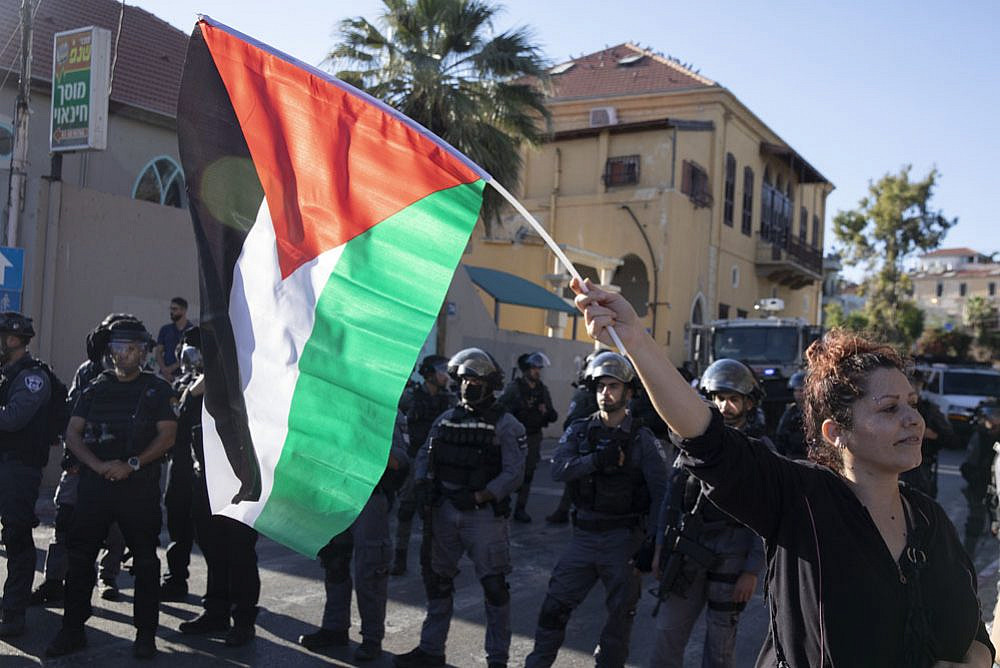

No comments:
Post a Comment
Note: only a member of this blog may post a comment.